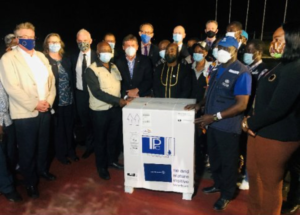Countries should not stop using AstraZeneca’s Covid-19 vaccine over fears it causes blood clots as there is no indication this is true, the World Health Organization says.
Bulgaria, Denmark and Norway are among the countries that have paused its use.
But on Friday a WHO spokeswoman said there was no link between the jab and an increased risk of developing a clot.
Margaret Harris said it was an “excellent vaccine” and should continue to be used.
Around 5 million Europeans have already received the AstraZeneca jab.
There have been about 30 cases in Europe of “thromboembolic events” – or developing blood clots – after the vaccine was administered. There were also reports that a 50-year-old man had died in Italy after developing deep vein thrombosis (DVT).
But no causal relationship had been established between the shot and the health problems reported, she said.
On Friday, AstraZeneca said the recorded number of blood clots in vaccinated people was “significantly lower… than would be expected among the general population”.
“An analysis of our safety data of more than 10 million records has shown no evidence of an increased risk of pulmonary embolism or deep vein thrombosis,” a spokesperson said.
Bulgaria’s decision to pause its rollout followed similar steps by Denmark, Iceland and Norway as well as Thailand. Italy and Austria have stopped using certain batches of the drug as a precautionary measure.
The European Medicines Agency, the EU’s medicines regulator, said earlier there was no indication the jab was causing the blood clots.
What’s the situation in Europe?
After cases declined in recent months, several European countries are now seeing a resurgence of the virus. France, Italy, Poland and Turkey have seen the highest numbers in recent weeks.
The whole of Italy is braced to enter the country’s strictest lockdown measures over the Easter weekend, 3 to 5 April.
Under rules set to be confirmed by the government, residents will only be allowed to leave home for work, health reasons, essential shopping or emergencies. All non-essential shops will be closed as will bars and restaurants. School lessons must be held online.

The total number of deaths in Italy rose to 100,000 on Monday – the highest toll in Europe after the UK. Officials say infection rates are rising as new variants of the virus take hold.
Doses in Liberia
According to the United Nations Children’s Fund (UNICEF) and World Health Organization (WHO) Liberia representatives, who turned over the boxes to Liberia through the Ministers of Foreign Affairs and Health, the boxes containing the 96,000 COVID-19 vaccine doses were flown via the COVAX initiative, a partnership between Coalition for Epidemic Preparedness Innovations (CEPI), Global Alliance for Vaccines and Immunizations Gavi, UNICEF and WHO.
The United States, Team Europe (the European Union and the European Union Member States), the United Kingdom, Japan and Canada are among the main donors to the COVAX Facility.























Comments are closed.